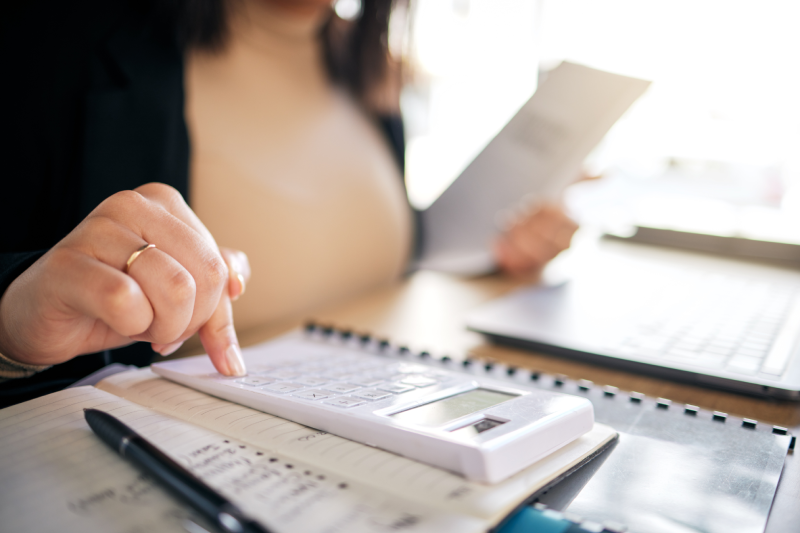If you’re a sole trader or business owner, you’ve doubtless heard of bookkeeping – even if you’re not entirely sure what it means. It’s an essential part of managing a business’s financial health, and so you want to make sure you’re familiar with the ins and outs of it.
There’s also some (understandable) confusion around the difference between bookkeeping and accounting, and it’s important to know the exact function of each when it comes to organising your finances.
We’re here to clear everything up for you – starting with the most basic question of all.
What is bookkeeping?
In a nutshell, bookkeeping is the process of recording the daily transactions which take place in a business.
This information will help you keep track of your income and spending, giving a clear picture of your business’s financial situation. Using this data also makes it much easier to predict what this might look like in the future.
The role of the bookkeeper
A bookkeeper’s job is to ensure transactions are correctly recorded and categorised. This generally involves taking quality control steps to verify the data, such as bank reconciliation.
Bank reconciliation involves cross-referencing your bookkeeping records with bank transactions to make sure they match up. Good accounting software should do this for you automatically, in real time.
A bookkeeper can also use your daily transactions to produce monthly reports, turning the raw numbers into something easier to read and comprehend. Some will even take on other technical tasks like running payroll.
The role is evolving, though, with many bookkeepers now offering a wide range of services. It’s why the line between bookkeeping and accounting is becoming increasingly blurred.
What’s the difference between bookkeeping and accounting?
Bookkeeping deals with the recording and organisation of day-to-day financial activity in a business, whereas accounting is more about long-term financial analysis and strategising.
Accountants are specially qualified to analyse financial reports and use them to help businesses improve moving forwards. Their responsibilities also include preparing official end-of-year reports (e.g. income and cash flow statements).
The reality is that both bookkeeping and accounting are vitally important to the continued financial health of a business, allowing the business owner to understand what’s working and what’s not.
Is bookkeeping a legal requirement?
Whether you’re a sole trader, a limited company, a freelancer, or in a partnership, HMRC expect you to maintain good bookkeeping records. These must accurately show what’s happening in your business, and include things like:
- All goods bought and sold
- Who you bought and sold them to and from
- Money spent by the business (e.g. receipts)
- Money received (e.g. invoices, loans, grants)
- Debts
Accurate and up-to-date bookkeeping helps keep you in HMRC’s good books, but there are other benefits too. For instance, recording all of your expenses properly means you’ll be able to claim them as tax relief against your tax bill. So don’t miss out on what you’re entitled to!
Should I hire a bookkeeper or an accountant?
Well, there are technically no rules stating that you have to use either! You can outsource your bookkeeping, or you can try and do it yourself if you so choose. This will obviously save you money, but you’ll have to set aside the time (and make sure you don’t make any errors!).
It’s also important to be realistic about your ability to handle everything on your own.
If you don’t feel confident doing it yourself (or you simply don’t have the time), then outsourcing to a bookkeeper and/or accountant is the way to go.
When it comes to choosing between a bookkeeper and an accountant, weigh up the pros and cons of each, and think about what kind of assistance your business would most benefit from. If you can find someone who offers both services, then great! Read our guide to comparing different accounting packages.
Do I need bookkeeping software?
You’ll obviously need some method of recording your expenses and cash flow, and bookkeeping software is one of the safest options available, enabling you to store your data on an ultra-secure server that you can access from anywhere.
Making Tax Digital and bookkeeping
As for whether or not bookkeeping software is essential, the answer depends on your circumstances. However, HMRC have begun rolling out a scheme called Making Tax Digital (MTD), which will presumably be a requirement for everyone in the future.
MTD is part of the government’s plan to bring the tax system into the 21st century by gradually digitising all records.
As of now, anyone who earns more than £50,000 of sole trader and/or property income in the 2024/25 tax year will have to comply with MTD Income Tax rules from April 2026. This threshold will then reduce to £30,000 the following April (2027) – and to £20,000 in April 2028.
While it may only impact some business types at the moment, you can choose to enrol voluntarily if you want to be ready for MTD and avoid any potential stress down the line.
Choosing bookkeeping software
Again, cloud-based software is the safest way to store your business’s financial information, and this is because data kept on the cloud is actually hosted on a number of different servers, all in different locations.
It’s also great for collaboration, as every change is universal and applies across all devices.
What’s more, real-time data can be accessed by any user, at any time, meaning everyone is able to stay in the loop. Handy if you’re working with an accountant or have a business partner!
Find more help in our online accounting hub, and learn more about how to find the right accountant for your business.








